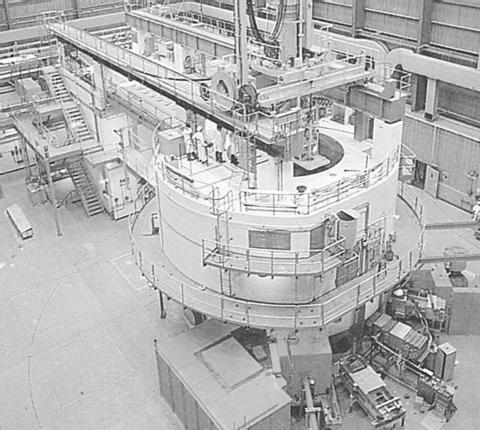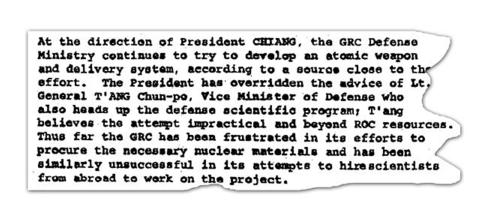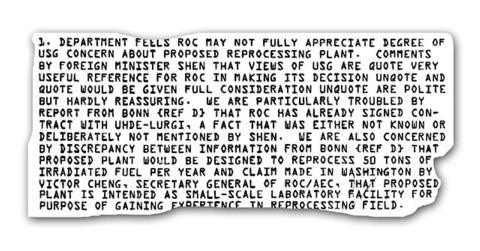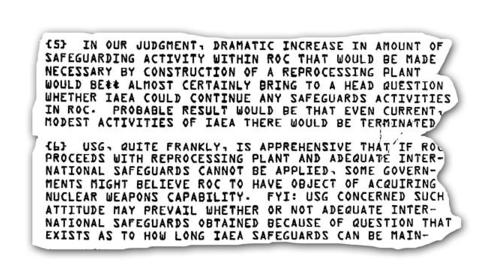Declassification and release of archive documents from the United States today, shows that Taiwan attempted to build nuclear weapons, despite government denials and US government opposition.
These formerly confidential files detail how the US State Department used its diplomatic influence and intelligence sources to promote non-proliferation and halt Taiwan's secretive nuclear weapons program.
But what the US government failed to do, the evidence suggests, was stop Taiwan from giving up entirely its ambition and ability to develop weapons of mass destruction.

SOURCE: THE ATOMIC ENERGY COUNCIL
The story begins in 1964, after China conducted its first nuclear test. Shortly afterward, Taiwan launched its own nuclear weapons program, dubbed the "Hsinchu Project."
There is contention over who was the principal figure behind the programme. Wu Ta-you (
This view was contradicted by National Taiwan University professor of history, Hsu Cho-yun, in a 1966 interview at the US Embassy in Taipei, who said Chiang Kai-shek was the motivating force.

"At the direction of President Chiang, the Chungshan Institute of Science and Technology, which superintends science research and development for the Ministry of National Defense, is continuing to push ahead with its program of developing an atomic weapon."
The quest for friends
Hsu said that Taiwan had difficulty finding nuclear materials for its research and its plans were often blocked.

Initially Taiwan asked the US and Israel for assistance, but the US flatly refused and Israel had its own security problems. Japan was approached but "reacted negatively, as it does to any effort to involve it in the development of nuclear weapons," an embassy document reported.
When Taiwan tried to buy a 50 megawatt heavy water nuclear power plant from the Federal Republic of Germany-based power company Siemens in 1967, the US issued a caution.
Nevertheless, that same year, the US' General Electric Corporation began construction of Taiwan's first nuclear power plant in the northeast part of the island.

Victor Cheng (
The US government later consented to support the sale of the German reactor, so that it would not appear to be contradicting itself and the reputation of the International Atomic Energy Agency to uphold safety standards.
"In view of unequivocal US statements of confidence in IAEA safeguard systems and US assurance to FRG [Federal Republic of Germany] that IAEA safeguards would not hinder German sales of nuclear equipment for peaceful purposes, the Department does not consider we should attempt to forestall sale through approach to either Siemens or FRG."

However, the telegram to the US embassy in Bonn added: "The Department (of state) intends to furnish FRG through other channels USG [US government] information on GRC purchase of Siemens reactor ... we are not yet convinced that purpose motivating GRC desire to buy Siemens reactor is unrelated to interest in nuclear weapons."
Intelligence information confirming this suspicion did get to the State Department, in December 1972, but by this time Taiwan's position in the international arena was already beginning to fade due to the emergence of China.
In 1971 Taiwan was pushed out of the United Nations and its continued participation in international organizations like IEAE was threatened.
After Taiwan lost its membership in the IEAE, a bilateral agreement with the United States -- which had backed efforts to build all three of the island's nuclear power plants -- continued to ensure that safety standards were being met.
"We recently learned that the ROC is considering the purchase of the essential parts for nuclear materials and reprocessing plant from commercial sources in the FRG. Such a plant reprocesses spent reactor cores and also produces significant quantities of plutonium, an essential component of nuclear weapons," a Dec. 14, 1972 memorandum said.
Cheng was advised of the US concern and "described the proposed reprocessing plant as a small scale laboratory exercise designed to develop experience in the reprocessing field," the memorandum added.
Small-scale research
Cheng further downplayed the matter, saying the facilities would cost US$250,000 and would be used to reprocess small amounts of spent reactor cores on an "experimental basis."
The US immediately pointed out to Taiwan that, according to the IEAE, strict standards had to be enforced for such a transfer to take place and that, in principle, the IEAE opposed the transfer of reprocessing plants to a "non-nuclear weapons state."
The US then began plying pressure on Germany and other countries that would be involved in the process. The IEAE board of governors in China also said they would not approve of the transfer.
In January 1973, US Embassy officials in Taiwan spoke to the foreign minister and urged him not to go ahead with the purchase.
The foreign minister, Shen Chang-huan (
Shen denied the idea of building a reprocessing plant had been approved by Taiwan's government, and did not tell the US that Taiwan had already signed a contract with a German firm to purchase the reprocessing plant.
The US confronted Shen over the matter, after which he told the US embassy that Taiwan would not be involved in the construction of a reprocessing plant, a February, 1973, memorandum confirms.
The US continued to monitor Taiwan's attempts to go ahead and construct a reprocessing facility on its own, but documents do not detail how Taiwan achieved this feat.
According to research by David Albright and Corey Gay, published in a "Bulletin of Atomic Scientists" article, entitled "Taiwan Nuclear Nightmare Averted," Taiwan continued on its own.
Their findings show that Taiwan began work in 1969 on uranium fuel, a reprocessing facility, and a plutonium chemistry laboratory.
These facilities were built with the help of equipment from France, Germany, the US and other countries, the article said.
From 1972 to 1974 Taiwan purchased about 100 metric tons of South African uranium, it said. It was also discovered that in 1970 a "Hot Laboratory" was being built and was expected to be completed in 1976.
Cheng, the AEC's secretary-general claimed the lab could only produce about 15 grams of plutonium a year, far short of that needed for a nuclear weapon, the article said.
The CIA concluded in 1974 that "Taipei conducts its small nuclear program with a weapon option clearly in mind, and it will be in a position to fabricate a nuclear device after five years or so," Albright and Gay wrote.
Under increasing international pressure on Sept. 14, 1976, Chiang Ching-kuo, then premier, said Taiwan would not engage in any reprocessing activities. That was not, however, the case.
It wasn't until over 10 years later, however, after the defection of a locally-recruited Central Intelligence agent, that Taiwan's program was brought to a halt.
Colonel Chang Hsien-yi (
Taiwan's official position since then has been that it will not use its scientific abilities to build nuclear weapons. But experts note that if Taiwan wanted to it could develop these weapons quickly, possibly within a year.

The CIA has a message for Chinese government officials worried about their place in Chinese President Xi Jinping’s (習近平) government: Come work with us. The agency released two Mandarin-language videos on social media on Thursday inviting disgruntled officials to contact the CIA. The recruitment videos posted on YouTube and X racked up more than 5 million views combined in their first day. The outreach comes as CIA Director John Ratcliffe has vowed to boost the agency’s use of intelligence from human sources and its focus on China, which has recently targeted US officials with its own espionage operations. The videos are “aimed at

STEADFAST FRIEND: The bills encourage increased Taiwan-US engagement and address China’s distortion of UN Resolution 2758 to isolate Taiwan internationally The Presidential Office yesterday thanked the US House of Representatives for unanimously passing two Taiwan-related bills highlighting its solid support for Taiwan’s democracy and global participation, and for deepening bilateral relations. One of the bills, the Taiwan Assurance Implementation Act, requires the US Department of State to periodically review its guidelines for engagement with Taiwan, and report to the US Congress on the guidelines and plans to lift self-imposed limitations on US-Taiwan engagement. The other bill is the Taiwan International Solidarity Act, which clarifies that UN Resolution 2758 does not address the issue of the representation of Taiwan or its people in

US Indo-Pacific Commander Admiral Samuel Paparo on Friday expressed concern over the rate at which China is diversifying its military exercises, the Financial Times (FT) reported on Saturday. “The rates of change on the depth and breadth of their exercises is the one non-linear effect that I’ve seen in the last year that wakes me up at night or keeps me up at night,” Paparo was quoted by FT as saying while attending the annual Sedona Forum at the McCain Institute in Arizona. Paparo also expressed concern over the speed with which China was expanding its military. While the US

SHIFT: Taiwan’s better-than-expected first-quarter GDP and signs of weakness in the US have driven global capital back to emerging markets, the central bank head said The central bank yesterday blamed market speculation for the steep rise in the local currency, and urged exporters and financial institutions to stay calm and stop panic sell-offs to avoid hurting their own profitability. The nation’s top monetary policymaker said that it would step in, if necessary, to maintain order and stability in the foreign exchange market. The remarks came as the NT dollar yesterday closed up NT$0.919 to NT$30.145 against the US dollar in Taipei trading, after rising as high as NT$29.59 in intraday trading. The local currency has surged 5.85 percent against the greenback over the past two sessions, central